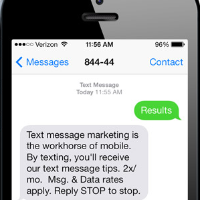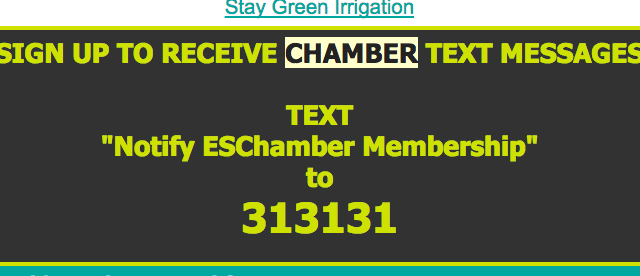Blog /
Text Message Marketing: How to Choose a SMS Keyword

What is a SMS keyword?
An SMS keyword is the word that a consumer sends to a phone number, usually a short code, to immediately receive information back. Often, used in text message marketing, the end result of the keyword is to encourage an opt-in to a database to be marketed to in the future.
CHOOSING A KEYWORD

Choosing an SMS keyword is one of the most important steps in your text message marketing strategy, because the keyword offers branding for your product offering. A business should choose a keyword that follows these tips:
- brands the business or promotion
- is easy to remember, so as to gain the viral pass-along effect from customers and employees
- is just one word to avoid problems with autocorrect
- is easy to spell
- is not an acronym
- does not include numbers
- is as short as possible
- is not some “clever” spelling of a keyword
YOU’LL NEED MULTIPLE KEYWORDS
The primary keyword that a business will want to reserve is its own name. This keyword will be the master keyword that is used continually for generating opt ins. This permanent keyword should be printed everywhere — on business cards, literature, t-shirts, outdoor signage, menus, and anywhere else that makes sense. If the business name is difficult to spell, clever, or contains multiple words, it may be best just to go with a single word keyword that best identifies what the business does. If a business wants to understandably reserve its difficult-to-spell brand name as a keyword, it should also consider reserving the potential misspellings of that SMS keyword.
Often, businesses have common names, and the keyword that your business wants may not be available from the short code provider. A second choice may be to pick the primary product that your business sells, but a keyword like “pizza” is likely not going to be available at an online shared short code provider. If the primary keyword a business wants is not available, you can choose an adjective that describes the business, such as “tasty” or “hungry.”
In addition to the primary keyword, your business is going to want to use different keywords for various promotions. Some of these promotions may be short-lived, and you will be able to retire those keywords after using them for the short-term promotion. Others may be annual events, and your business will want to retain those keywords in its online accounts, because if they are released, another business may pick them up. The advantage to using new keywords is that it will get your regular customers participating in your texting program again, and you can place those users into a different database, which may be helpful in segmenting for future promotions.
TIPS ON KEYWORD SELECTION
One of the great things about an SMS strategy is the tremendous viral advantage. If a person knows that his friend likes to get coffee at Dunkin’ Donuts, he will pass along the keyword and short code to that friend. It is not unusual for a business to get 15-20 percent of its mobile coupon redemptions from viral sharing. But the consumer may not remember to do so if the keyword and short code are not easy to remember, so it is always best to keep things simple and memorable when it comes to choosing a keyword and short code.
Keywords that are compound words or two words are also not good choices. A business might have the best cheesecake in the world, but “cheesecake” is not a very good keyword because some people will spell it as two words (cheese cake), and some will intend to spell it as one word, but autocorrect will “fix” it for them. Automated SMS response systems cannot detect the user’s intent, only the exact spelling, so picking the wrong keyword could result in lost opt in opportunities.
From the text message marketing, one memorable SMS promotion was a sweepstakes that gave away a trip to Hawaii. the advertiser chose the keyword “Hawaii.” Although a wonderful place, Hawaii is not particularly easy to spell. Moreover, some people include an apostrophe when spelling it. Hawaii was not a good choice as a keyword because of the difficulty in spelling it. Acronyms, such as KFC, don’t make for good keywords either because autocorrect will inevitably try to change the acronym into a real word. Avoid numbers in keywords as well. It is confusing to think of texting a number to a number. But more importantly, there is that zero and “oh” thing. When it comes to texting, consumers often don’t recognize what is a letter (O) and what is a number (0)!

Typing on a mobile phone is not easy. There are a lot more misspellings on the smaller screen of the phone than on a desktop computer. Fat-finger misspellings are a common problem on mobile. That is why using a short keyword is far better than a long keyword; there are fewer chances to misspell a keyword with fewer letters.
Another poor idea is using a clever spelling of a word as your keyword. A restaurant called “Finger Lickin’ Chickin’” may be a snappy name, but using “chickin” as a keyword is not a good idea because a customer’s autocorrect is likely going to correct hat word to the proper spelling of chicken.
One of the questions often asked in text message marketing is in regards to capitalization of keywords. Using caps or lowercase letters has no impact on the SMS keyword so don’t worry about it. To make the keyword stand out, the best way to write it in your advertisement is to use all capital letters, but if somebody responds in lowercase, the interactive text message will still work properly.
Some keywords are not available to businesses because the phoen carriers have reserved them, and thus they are not available on short codes. Keywords such as STOP, HELP, INFO, END, CANCEL, UNSUBSCRIBE, QUIT, and others are taken before the short code is activated in the marketplace.
This article is mostly taken from Bob Bentz’s book “Relevance Raises Response: How to Engage and Acquire with Mobile Marketing.” The book can be found at Amazon and many online book retailers.

Related Articles:









